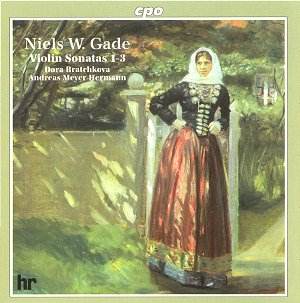Niels GADE
Violin Sonatas no. 1 in A op. 6, no. 2 in D minor Op.21, no.
3 in B flat, op.59.
 Dora Bratchkova (violin),
Andreas Meyer-Hermann ( piano)
Dora Bratchkova (violin),
Andreas Meyer-Hermann ( piano)
 CPO 999 644
- 2 (DDD) [63.23]
CPO 999 644
- 2 (DDD) [63.23]
Crotchet
Amazon
UK
Amazon
USA Midprice

Niels Gade was a Danish composer who lived from 1817 to 1890. For those who
like comparisons his music stands between Mendelssohn and early Brahms rather
than the rich mellowness of his sublime last works. Gade wrote eight symphonies,
ballets, chamber music and a splendid Violin Concerto. His music is
very attractive if not outstanding and in this he was very much like Grieg
who was obviously influenced by him.
I have known these violin sonatas for many years and later the first and
third sonatas came out on DMA-023 with Kontra and Jedlickova as the soloists.
The Sonata in A is very attractive with memorable themes. But the
worry is that the piano part is so sturdy that we are left with the impression
that this is a sonata for piano with violin accompaniment as were Mozart's
early sonatas in this genre. The piano part is too predominant and, yet one
moment is felicitous a la Mendelssohn and the next as powerful as early Brahms.
The recording is too close to the piano so that the intimacy of the scores
is lost. The violin is thereby presented as lyrical and the piano as virtuosic,
two completely different styles. Even allowing for the grandeur of the piano
part, it is too forward and, quite frankly, annoying. It sounds as if the
pianist is taking charge and does not care about the violinist or the balance.
The slow movement has a simple and very impressive theme. Perhaps it smacks
a little of juvenilia. Sometimes I wondered if the violinist had left the
stage. Beautiful music but given more space it could be choice. But let's
not knock it. Most people will overlook the weakness of immaturity in favour
of a good tune . After all, they do it all
the time with Schubert. The violinist puts as much expression into it as
the pianist allows but he does not reiterate. He does not seem to have a
heart. And yet the paradox is that he suddenly makes the music banal and
I had visions of Max Jaffa and the Palm Court Orchestra. Oh dear! In the
finale, the violin is again "the second fiddle". Cascades of piano notes
reminding me of one of those annoying Channel 4 newsreader/interviewers who
asks questions, give comments and also give the answers and allows the
interviewee to say little. The music does degenerate a little into salon music.
The piano is still too forward and thunderous at times. Perhaps the recording
engineer does not like the violin or the violoinist. The piano playing is
also eccentric and exaggerated.
The D minor Sonata is the best of the three. It dates from 1849, seven
years after the A major. The balance is sometimes better in this piece which
is a more mature work. All three movements are basically quick, or have quick
sections, with slow introductions although the second is really and a-b-a
design. The first movement is a model of excellent construction. The second
movement has a lovely theme which would have been lovelier if the pianist
had allowed some rubato. The scherzando section suffers from the pianist
being a Bruce Forsyth I'm in charge character. The return of the lovely
theme is most welcome and gives the pianist time off from his Evgeny Kissin-style
demolition playing!
The finale is a sunny piece and would fare better if the pianist allowed
Gade to speak rather than himself. Performers are the servants of music not
the composers of it. This is why people like Glenn Gould, Yehudi Menuhin,
Evgeny Kissin, Karajan and Rattle go astray and where the truly great artists
like Katin. Mullova, John Lill, Adrian Boult and Bryden Thomson excel. And
yet they are not offered such praise. But then it is the same in other art
forms. John Wayne and Brad Pitt are not great actors. They are not Oliviers
or Alec Guinesses and yet they are probably more popular. Popularity and
hero-worship are not evidence of greatness.
The Sonata in B flat I did not give as much attention to. It began
as if it were to be a big virtuosic piano sonata. The piano playing was very
exaggerarated and I was now weary of it. The slow movement could have been
serene if we had a different pianist! I would like to recommend this disc
whole-heartedly but I can't! It is such a pity. The violinist is good as
is the music but the pianist and the recording is awful. By this I do not
mean that the pianist is incompetent. He isn't. He is just too loud and
eccentric, the centre of attraction.
David Wright
